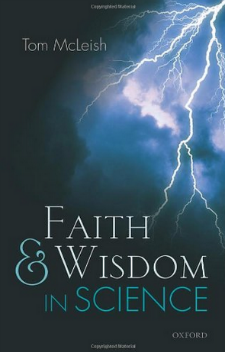Faith and Wisdom in Science
Thoughtful book that challenges notion that science and faith are poles apart and brings fresh perspectives
 Faith and Wisdom in Science
Faith and Wisdom in Science
By Tom McLeish
Oxford University Press
ISBN: 978-0198702610
Reviewed by David Gregory
McLeish – Professor of Physics at Durham University and Fellow of the Royal Society – challenges the notion that science and faith are poles apart in his deeply thoughtful and insightful book. Yet, by his own admission it is not about the interaction of science and faith, of which there are many offerings. His is a loftier goal – the development of a “Theology of Science” (pg 166).
McLeish brings fresh perspectives beyond the areas of debate commonly found. Drawing upon his own research experience, he emphasises the order that arises out of the disorder of creation, a characteristics illustrated from his area of expertise in materials science, along with discussions of the quantum world and geophysics.
Biblically, he goes beyond the classic creation stories, helpfully alerting the reader to a wider range of nature narratives of the Old Testament, culminating in an extensive exploration of creation imagery within the book of Job.
In the opening chapters he explores the nature of science, although he prefers the historic description “natural philosophy” with its links to wisdom rather than knowledge. This demonstrates a love of language, a thread woven through the book.
Insights from enquiring minds of medieval era into the nature of creation are a delight to explore, suggesting that science has a deeper history in human culture and consciousness than being a purely modern construct.
Science as an exploration of wisdom links to McLeish’s discussion of nature texts of the Old Testament (chapter 3), central to which are the images of creation within the book of Job (chapter 4), where he draws heavily upon the recent commentary by David Clines (Job, Vol 3, Thomas Nelson, 2013).
From a foundational text for his thesis – the “Hymn to Wisdom” of Job 28 – he suggests “wisdom is to be found in participating in a deep understanding of the world; its structures and dynamics” (pg 134). This contrasts with Clines and others, whose view of the text is that search for wisdom in creation is a disappointment. Rather “wisdom is to fear the Lord”.
In chapter 5, he more briefly engages with the New Testament creation texts of, leading to chapter 6 – “A Theology of Science?” A question rather than a statement, perhaps indicative of the preliminary nature of a framework for a theology rather than a completely defined one.
Common elements of science and theology are highlighted – a movement from puzzlement to understanding, the asking of questions and the possibility ambiguity and pain. Even love – “a super-rational .. emotionally engaged delight in … the well being of another” (pg 196). Perhaps an over personalisation yet which captures the experience of those involved in scientific research beyond cold rationally. The synergy McLeish sees between these two spheres of human endeavour lead him to suggest that “science becomes, within a Christian theology, the grounded out working of the ministry of reconciliation” (pg 209).
The final chapter addresses how this notion of science as reconciliation is played out within the practice of science, in both the research community and wider society. Acting to counter a fear of science, and a trend towards economic value and utility as the main measures of research, restoration of science as a “love of wisdom to do with natural things” (pg 259) and as part of our reconciling to nature, gives a greater sense of purpose to scientific endeavour.
This is a book that requires careful reading; perhaps some prior knowledge of science may be helpful in navigating some sections. And while some of the biblical analysis can be debated, for any interested in this area it provides a fresh contribution, widening perspectives both of science and faith and leaving the reader with much to reflect upon.
The Revd Dr David Gregory is Senior Minister, Croxley Green Baptist Church
Baptist Times, 23/04/2015